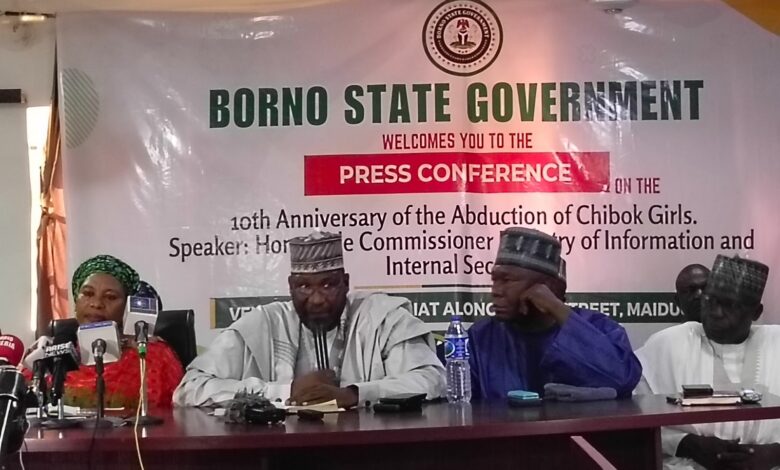A Decade After, 89 Abducted Chibok Girls Still Missing – Borno Gov’t
State government officials say they remain committed to the safe return of all the abducted girls despite reports confirming some of them have died in captivity.

Ten years have passed since the infamous night of April 14, 2014, when Boko Haram insurgents stormed the Government Girls Secondary School in Chibok, Borno State, abducting 276 girls and igniting global outrage. A decade later, the fate of 89 of these girls remains uncertain.
The tragic anniversary brings to light both the progress and the ongoing challenges in securing their release.
In a press briefing to commemorate this dark chapter in Nigeria’s history, Professor Usman Tar, Borno’s Commissioner for Information and Internal Security, said on Saturday that the authorities will not rest on their oars “until the last of our innocent girls are back home with their families”.
The Borno State Government said it has been actively involved in efforts to recover the Chibok girls and support those who have been rescued. With 187 girls having been rescued to date, the government said its focus extends beyond their physical recovery to their psychological and social rehabilitation.
According to Tar, the government’s commitment is unwavering.
“We remain hopeful and determined that, with the combined efforts of our security forces, intelligence agencies, and community support, all abducted persons will be safely returned,” he said at the NUJ House in Maiduguri.
“The Borno State Government will not rest until every missing person is found and returned home safely. We call for unity and support from all citizens as we navigate these challenging times together. Our thoughts and prayers are with the families of the abducted Chibok girls and, indeed, all missing persons. We will continue to stand together during this difficult time.”
Hajiya Zuwaira Gambo, the Borno State Commissioner of Women Affairs and Social Development, who was also at the anniversary briefing, gave a detailed account of the state of the rescued girls.
“Some are with us, the majority went through the Federal Ministry of Women Affairs where some were sent to school abroad, some went to APTI University Yola, and very few went back to Chibok to live with their parents,” she explained.
She said her ministry takes a hands-on approach to manage the wellbeing of those rescued from captivity.
“Many of the rescued girls have been enrolled in schools and universities, both within Nigeria and overseas. Some have availed themselves of scholarships or empowerment programmes aimed at helping them rebuild their lives. For those who have become mothers during their ordeal, the government has provided nurseries for their children while the mothers receive vocational training through initiatives like the 2nd Chance School.”
Reporters at the briefing asked why some girls remain in government care rather than with their families.
Gambo noted that while some girls had initially been placed in state care, a few opted to return to their families and did not come back. The girls currently in state custody are receiving tailored support as they navigate the complexities of life after their traumatic experiences. She added that despite the successes, the unreturned girls weigh heavily on the state’s conscience.
“We understand the pain and anguish that the families of those still in captivity are going through; this is our sorrow,” Tar said.
“As we reflect on the 10th anniversary of the Chibok abductions, the commitment to the girls’ return remains firm. We will continue to stand together during this difficult time.”
The fate of the 89 schoolgirls who are still missing or awaiting rescue remains uncertain. The chances of finding the remaining girls, who have now grown into women, are held in a delicate balance as parents and government officials continue to nurture the flickering flame of hope ignited a decade ago.
Amnesty International had in May 2014 blamed the Nigerian government for the abduction of the Chibok schoolgirls. The non-governmental organisation said it had collected incriminating testimonies indicating that Nigerian security forces neglected actionable intelligence regarding Boko Haram’s planned armed attack on the state-run boarding school in Chibok.
Promises from state and federal government officials to bring back the remaining Chibok girls still in captivity are echoed almost every year without the acknowledgement that many of the girls unaccounted for have died.
HumAngle reported in 2020 that many of the abducted girls have sadly lost their lives to air strikes, harsh living conditions in the forests, exposure to diseases, and complications from childbirth.
One of the released Chibok girls now studying at the American University of Nigeria (AUN) told us two years later that the government asked them to keep information about the death of their mates to themselves and not to share this with their families, an instruction that has since troubled her.
“Three out of the six people from my village, Mifa, died there and their parents are asking us that ‘what about our daughters?’” she said. “Sometimes, I am confused. I don’t know what to say. I am telling them that God will bring them back, but they are not alive. It is a sin, seriously.”
Speaking to The Guardian, Aisha Yesufu, co-founder of the Bring Back Our Girls (BBOG) movement, recently asked the authorities to disclose information about these fatalities so that their families can have closure.
Support Our Journalism
There are millions of ordinary people affected by conflict in Africa whose stories are missing in the mainstream media. HumAngle is determined to tell those challenging and under-reported stories, hoping that the people impacted by these conflicts will find the safety and security they deserve.
To ensure that we continue to provide public service coverage, we have a small favour to ask you. We want you to be part of our journalistic endeavour by contributing a token to us.
Your donation will further promote a robust, free, and independent media.
Donate HereStay Closer To The Stories That Matter




